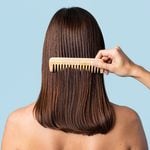Does Rosemary Water Help Hair Grow?

Two experts weigh in.
From DIM supplements to fascia massages, TikTok has become a popular platform for discovering the latest beauty and skin-care trends. The next big thing? Rosemary water—its hashtag has over 1.2 billion views on the social app.
In one video that’s been saved over 148,000 times, TikTok creator @mizna documents her experience using rosemary water for 30 days. Before washing her hair every day, she sprayed rosemary water on her scalp and hair, and applied rosemary oil every three to four days like a mask, and massaged her scalp. After a couple of weeks, she said she had “a lot less hair falling out” when she combed it. After thirty days, she saw “baby hair growing in every direction.” Of course, it’s essential to be skeptical and take any TikTok trend with a grain of salt until proven otherwise. But one reason rosemary water is so alluring is that it’s an all-natural home remedy, meaning influencers aren’t benefiting from brand deals to plug the trend. Could it really work?
It’s simple enough to make: Just grab some rosemary leaves, rinse them and boil them in a pot of water. Remove the leaves and allow the infused water to cool down. Once it’s cooled to room temperature, pour it into a spray bottle and spritz it onto your hair. You can spray it on and let it soak in for a few minutes before washing your hair in the shower or leave it on until your next hair wash.
So, is there any real science behind this home remedy for hair growth? To find out, we asked hair transplant surgeon Quinton Chivers and dermatologist Renita Ahluwalia, the founders of the Canadian Dermatology and Plastic Surgery Centre in Toronto.
Can rosemary help with hair growth?
The short answer is yes. “Its minimal side effects make it a safe option for those looking for a natural approach to enhance hair growth,” says Ahluwalia.
Breaking down the science behind it, rosemary oil and rosemary water boast components like caffeic acid, rosmarinic acid, camphor, and 12-methoxyxarnosic acid. Ahluwalia says these ingredients reduce inflammation, contributing to the overall health of the scalp and promoting healthy hair. Ahluwalia says it’s not uncommon for patients in her practice to incorporate rosemary water into their routines. Many patients prefer nightly application and keep a spray bottle by their bed, while some like to apply it and then rinse it out before washing their hair or spray it on as a leave-on treatment.
“Compared to other natural products and many commercial hair products advertised to promote hair growth, the evidence for rosemary is substantial,” says Chivers. He shares that a 2015 study with a randomized control trial of 100 patients compared those who used rosemary oil with those who used 2 percent minoxidil (a medication used to treat hair loss). Both groups experienced a significant increase in hair count, with less irritation for those in the rosemary group.
Should I use rosemary water or oil for my hair?
If you’re considering trying rosemary oil or water for your hair, it’s best to experiment to find what works best for your hair type and gives you your desired results. Rosemary oil can be more effective for those with thicker hair because it won’t weigh it down or make it appear greasy, says Ahluwalia. Those with thinner hair should stick with rosemary water.
Does rosemary help with all hair loss?
Struggling with hair loss can be distressing. Before turning to rosemary oil or water, it’s best to talk to your doctor to find the most effective solution for you. Since not all hair loss is the same, Ahluwalia says that the benefit of consulting with a medical professional is to receive an individualized plan tailored to your needs, supported by blood test results. Blood tests reveal factors that can contribute to hair loss, including thyroid-stimulating hormone (TSH), ferritin and B12 levels, she says.
Ahluwalia and Quintin agree that using rosemary is a reasonable option for patients who want a natural approach. In fact, “many patients are irritated from minoxidil, do not want oral medications or do not want the cost of in-office procedures,” Ahluwalia says. So it’s a great option—even Chivers uses rosemary-infused shampoo every day.




